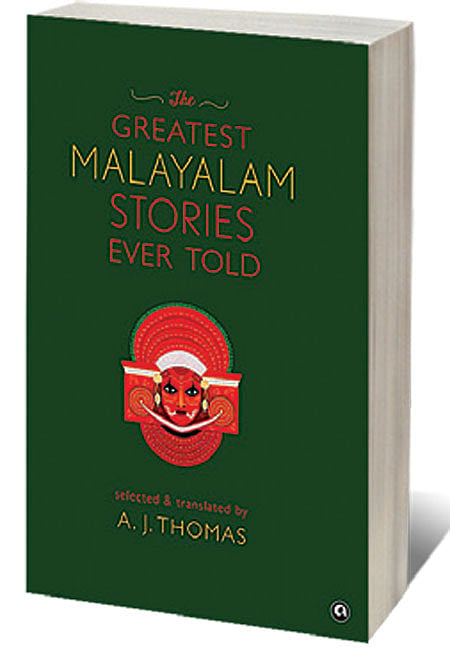Metaphorical Malayalee

IN 1891, THE Malayalam literary magazineVidya Vinodini published a short story named ‘Vasana Vikriti’ (‘Strange Stirrings’) by Kesari Vengayil Kunhiraman Nayanar. This, writes AJ Thomas in his introduction to The Greatest Malayalam Stories Ever Told, was the very first Malayalam short story that “exhibited the essential features of the form”. Thomas goes on to provide a brief insight into the evolution of the short story in Malayalam: beginning with loosely narrated, frequently verbose tales, then passing through a phase of more structured, realist stories; going on to modernist styles, with a plethora of allegories, fantasies and symbols, before transitioning into the ‘after-modern’ phase.
This introduction is, in its way, a good gateway to the stories Thomas has selected and translated for The Greatest Malayalam Stories Ever Told: it offers an insightful, informative glimpse of what to expect.
The fifty stories comprising this book are arranged chronologically according to their respective authors’ year of birth, with Karoor Neelakanta Pillai (born 1898) beginning the collection with ‘Wooden Dolls’, about a woman crafting painted dolls to earn a living. The progression and evolution of the Malayalam short story can be seen as the book progresses. For example, the stories at the start, like Ponkunnam Varkey’s poignant ‘The Speaking Plough’ or Thakazhi Sivasankara Pillai’s ‘The Farmer’, are rather more conventional, stories that speak of the farmer and the land, of poverty and how it affects the agricultural communities of Kerala. Further into the book, the themes and treatment of the stories become more eclectic, more modern and experimental: allegories creep in (as in Uroob’s ‘The Fair Child’); stories become more abstract, more open to interpretation by a reader. Disturbing truths are dwelt upon, and sometimes (as in MP Narayana Pillai’s ‘The Court of King George VI’), the near absurdity of the story can make one wonder: what, really, is the author trying to say?
Openomics 2026: Continuity and Conviction
06 Feb 2026 - Vol 04 | Issue 57
The performance state at its peak
The themes covered in these stories are multifarious. Poverty, a hallmark theme in a lot of Indian writing (not just Malayalam), is there, and it shows itself again and again throughout the collection. Casteism and communalism rear their ugly heads, with Sara Joseph’s ‘Sweat Marks’, about a bright young woman being denied what she merits after excelling in academics, hits especially hard, more so for being subtle. This being, after all, Kerala, communism and relations with the erstwhile Soviet Union come through vividly in several stories, including NS Madhavan’s ‘The Fourth World’. Human relationships form the focus of many stories: OV Vijayan’s heart-wrenching ‘The Hanging’, for instance, is about a poor villager making a trip to a city jail to meet his son in prison; or the whimsical ‘The Ship of Butterflies’ (by Thomas Joseph), in which a naval captain pines for the wife who’s died.
The sheer variety—of settings, characters, styles, genres—on display in this book means there’s something for just about any reader. There’s satire, as in Vaikom Muhammad Basheer’s ‘The World-Renowned Nose’. Or the dawning horror as one follows two children as they go to get themselves photographed in M Mukundan’s ‘The Photo’. SK Pottekkatt’s ‘On the Riverbank’ is a lyrical description of nature, and Rajalakshmi’s excellent ‘The Apology’, about a confrontation between a college student and a lecturer, which gets blown out of proportion, offers a glimpse of politics at work in human relationships.
Interestingly, too, not all these stories are set in Kerala: they range far and wide. Lalithambika Antharjanam’s ‘Dhirendu Majumdar’s Mother’, for instance, is firmly Bengali in its ethos; T Padmanabhan’s ‘The Death of Makhan Singh’ is set in Kashmir, and Nandanar’s ‘Humans and Animals’ takes place in an army barracks somewhere in north India.
This is a fine collection of stories, richly textured, engrossing, deliciously diverse. At times provocative, always evocative. An excellent sampling of Malayalam literature in its short form.

